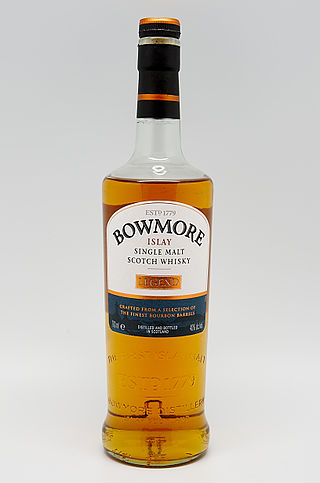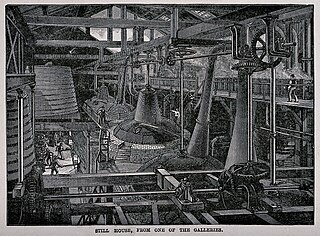Related Research Articles

Canadian whisky is a type of whisky produced in Canada. Most Canadian whiskies are blended multi-grain liquors containing a large percentage of corn spirits, and are typically lighter and smoother than other whisky styles. When Canadian distillers began adding small amounts of highly-flavourful rye grain to their mashes, people began demanding this new rye-flavoured whisky, referring to it simply as "rye". Today, as for the past two centuries, the terms "rye whisky" and "Canadian whisky" are used interchangeably in Canada and refer to exactly the same product, which generally is made with only a small amount of rye grain.

Scotch whisky, often simply called whisky or Scotch, is malt whisky or grain whisky made in Scotland.

Whisky or whiskey is a type of liquor made from fermented grain mash. Various grains are used for different varieties, including barley, corn, rye, and wheat. Whisky is typically aged in wooden casks, which are typically made of charred white oak. Uncharred white oak casks previously used for the aging of port, rum or sherry are also sometimes used.

Bourbon whiskey is a barrel-aged American whiskey made primarily from corn (maize). The name derives from the French House of Bourbon, although the precise source of inspiration is uncertain; contenders include Bourbon County, Kentucky, and Bourbon Street in New Orleans, both of which are named after the House of Bourbon. The name bourbon might not have been used until the 1850s, and the association with Bourbon County was not evident until the 1870s.

Single malt whisky is malt whisky from a single distillery.
A blended whiskey is the product of blending different types of whiskeys and sometimes also neutral spirits, colorings, and flavorings. It is generally the product of mixing one or more higher-quality straight or single malt whiskey with less expensive spirits and other ingredients. This typically allows for a lower priced finished product, although expensive "premium" varieties also exist.

Rye whiskey can refer to two different, but related, types of whiskey:

Corn whiskey is an American liquor made principally from corn. Distinct from the stereotypical American moonshine, in which sugar is normally added to the mash, corn whiskey uses a traditional mash process, and is subject to the tax and identity laws for alcohol under federal law.

Jim Beam is an American brand of bourbon whiskey produced in Clermont, Kentucky, by Suntory Global Spirits. It is one of the best-selling brands of bourbon in the world. Since 1795, seven generations of the Beam family have been involved in whiskey production for the company that produces the brand. The brand name became "Jim Beam" in 1943 in honor of James B. Beam, who rebuilt the business after Prohibition ended. Previously produced by the Beam family and later owned by the Fortune Brands holding company, the brand was purchased by Suntory Holdings in 2014.

Grain whisky normally refers to any whisky made, at least in part, from grains other than malted barley. Frequently used grains include maize, wheat, and rye. Grain whiskies usually contain some malted barley to provide enzymes needed for mashing and are required to include it if they are produced in Ireland or Scotland. Whisky made only from malted barley is generally called "malt whisky" rather than grain whisky. Most American and Canadian whiskies are grain whiskies.

A blended malt, formerly called a vatted malt, or pure malt, is a blend of different single malt whiskies from different distilleries. These terms are most commonly used in reference to Scotch whisky, or whisky in that style, such as Japanese whisky.

Bottled in bond (BIB) is a label for an American-produced distilled beverage that has been aged and bottled according to a set of legal regulations contained in the United States government's Standards of Identity for Distilled Spirits, as originally specified in the Bottled-in-Bond Act of 1897. As a reaction to widespread adulteration of American whiskey, the act made the federal government the guarantor of a spirit's authenticity, gave producers a tax incentive for participating and helped ensure proper accounting and the collection of tax that was due. Although the regulations apply to all spirits, most bonded spirits are whiskeys in practice.

Malt whisky is whisky made from a fermented mash consisting of malted barley. If the product is made exclusively at a single distillery, it is typically called a single malt whisky. Although malt whisky can be made using other malted grains besides barley, those types are not called malt whisky without specifying the grain, such as rye malt whisky or buckwheat malt whisky.

American whiskey is whiskey produced in the United States. American whiskeys made from mashes with at least 51% of their named grains include bourbon whiskey, rye whiskey, rye malt whiskey, malt whiskey, wheat whiskey, Tennessee whiskey, and corn whiskey.

J.P. Wiser's Whisky is a Canadian whisky producer and one of the oldest in the country, established in 1857. Since 1935, it has held a majority stake in Corby Spirit and Wine. In 2005 the international Liquor company Pernod Ricard took ownership of both companies. Hiram Walker & Sons Limited currently produce J.P. Wiser's Whisky at their Windsor, Ontario, distillery.

Korn, also known as Kornbrand or Kornbranntwein, is a German colorless distilled beverage produced from fermented cereal grain seed. The production of Korn uses only five grains: most of the production is based on rye or wheat; barley is mainly used to obtain the required malt for the brewing process; oats and buckwheat are rarely used. The addition of food colorings, flavorings, or sweeteners is not permitted. Korn is distilled to lower alcoholic proofs and less rigorously filtered than vodka, which leaves more of the cereal grain flavor in the finished spirit.

Bulleit Bourbon is a brand of Kentucky straight bourbon whiskey produced at the Bulleit Distillery in Lebanon, Kentucky and the Bulleit Distillery in Shelbyville, Kentucky, owned by the Diageo beverage conglomerate. It is characterized by a high rye content for a bourbon and being aged at least six years. It is bottled at 45% abv for the US, Canadian, British, Dutch and Mexican markets. For Australian and Danish markets, it is bottled at 40% abv. It is also sold in Germany, Norway and Sweden.

Nelson's Green Brier Distillery is a whiskey distillery located in downtown Nashville, Tennessee that produces different varieties of Tennessee whiskey and bourbons. The distillery offers daily public tours and tastings as well as a large mercantile shop with bottles, barware and apparel available for purchase. In July 2023, Nelson's Green Brier Distillery opened a newly renovated distillery restaurant and full-service bar at their 1414 Clinton St. Nashville, TN 37203 location. The same facility also now offers four new private event and dining spaces available to rent for corporate functions, weddings and celebrations of varying sizes.

Heaven Hill Kentucky Whiskey is an American blended whiskey produced in Bardstown, Kentucky by Heaven Hill Distilleries. The company sells a variety of blended whiskeys and straight bourbons in 16 oz, 750ml, and 1-liter glass bottles, and in 1.75L plastic bottles.

The following outline is provided as an overview of and topical guide to whisky:
References
- 1 2 3 "Standards of Identity for Distilled Spirits, Title 27 Code of Federal Regulations, Pt. 5.22(1)(iii)" (PDF). Retrieved October 17, 2008.
- ↑ Banaag, Juan (March 16, 2022). "The bourbon whiskey market continues to increase". Lane Report. Retrieved March 16, 2022.
- 1 2 3 "Chapter I—Alcohol And Tobacco Tax And Trade Bureau, Department Of The Treasury; Part 5—Labeling And Advertising of Distilled Spirits". Title 27–Alcohol, Tobacco Products and Firearms. US Government. Retrieved October 18, 2021.
- ↑ "Statements of Age", U.S. Alcohol and Tobacco Tax and Trade Bureau, April 2007, page 8-15.
- 1 2 "The Scotch Whisky Regulations 2009: Guidance for Producers and Bottlers" (PDF). Scotch Whisky Association. December 2, 2009. Retrieved September 24, 2012.
- ↑ "Canadian Food and Drug Regulations (C.R.C., c. 870) - Canadian Whisky, Canadian Rye Whisky or Rye Whisky (B.02.020)" Archived July 9, 2012, at archive.today . (Access date December 15, 2010.)